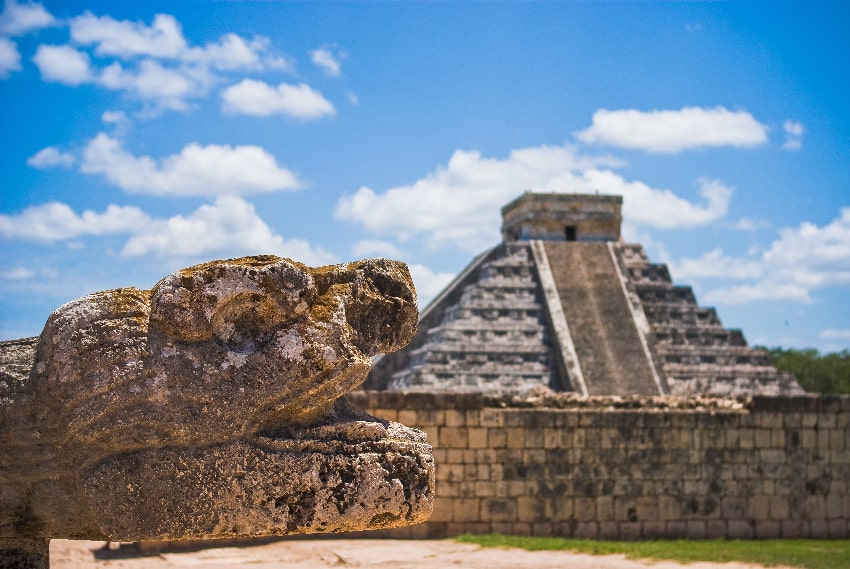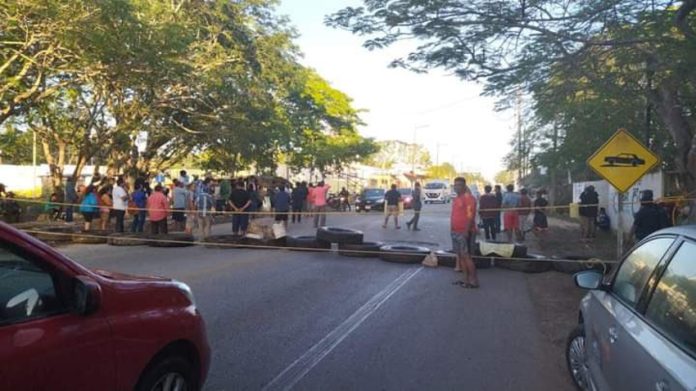Roads and highways leading to the archaeological zone of Chichén Itzá in the state of Yucatán were blocked Monday due to a protest by Indigenous community leaders, artisans, merchants, tour guides and others.
The largely Mayan-speaking protesters said their rights have been violated continually, and they called for the removal of Marco Antonio Santos Ramírez, the Chichén Itzá site director for the National Institute of Anthropology and History (INAH).
Their claim is that Santos Ramírez and the INAH have prevented them from carrying out their activities in the area that just last week was declared Mexico’s No. 1 archaeological site, with 2.5 million visitors recorded in 2022.
Though the protesters came from 14 communities, most of them were from Pisté, Xcalacoop and San Felipe Nuevo, which are adjacent to Chichén Itzá. The road blockages began at 7 a.m. Monday, with the aim of preventing tourists from reaching the world-famous pre-Hispanic site.

Members of the National Guard and the state and municipal police were on hand to monitor the activities.
“The Mayan community of Eastern Yucatán is tired of the mafia headed by [Santos Ramírez], who wants to destroy the Mayan culture and prevent indigenous people from working on the site,” said Arturo Ciau Puc, the leader of an indigenous affairs organization in Yucatán, as quoted by Aristegui Noticias.
“The campesinos are tired because three years ago they sent a petition and complaints with evidence to the president of Mexico, Andrés Manuel López Obrador, and to the general director of INAH, Diego Prieto Hernández, to solve the problem — and nothing,” he added. “There was no answer.”
Ciau Puc said farmers, too, were participating in the protest because they live on one side of the archaeological zone, “and they are not allowed to plant.”
He also asserted that the authorities prohibit vendors and artisans (who don’t speak Spanish) from speaking in Mayan, and claimed tour guides who don’t hand over a percentage of their earnings are denied from working.
In addition, according to Aristegui Noticias, vendors and others who work inside the gates at the archaeological zone are prevented from setting up shop near the site’s main pyramid, known as El Castillo (The Castle) and Temple of Kukulcán.
Meanwhile, community leaders were quoted by the paper as saying they have photographic and “other evidence” that tourists have been allowed to climb the pyramid’s 365 steps — a practice that has been banned for 16 years, and which landed one tourist in hot water who made the climb in November.
“We know that up to (US) $5,000 is charged for the visitor to have that privilege,” the paper quoted them as saying.
“All this is already known to the INAH authorities and the president of Mexico,” Ciau Puc said. “We call for peace to remove Marco Antonio Santos Ramírez and return Chichén Itzá to us, to return our Mayan culture to us,” he said as the blockade was starting. “They want to destroy us.”
The newspaper El Universal reported that artisans and merchants who work inside Chichén Itzá have long been requesting the expropriation of 700 hectares located in the archaeological zone, and also that 15% of the income that INAH collects be allocated to nearby communities.
The newspaper El Queretano reported that an offer for a Jan. 6 meeting between the two sides had been rejected by members of the community front.
Officials at Chichén Itzá reported that it was business as usual on Monday, that they opened at 8 a.m. and were welcoming any tourists who were able to arrive at the site.
However, by the afternoon, Diario de Yucatán reported that “thousands of tourists were not able to reach the site” and that the leader of the Xcalacoop ejido said they would not stop the road blocks until their demands had been met.
With reports from El Universal, Aristegui Noticias, El Queretano, La Jornada Maya and Diario de Yucatán
